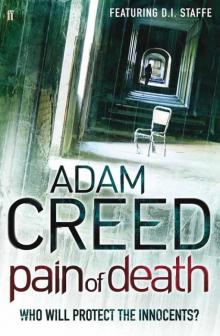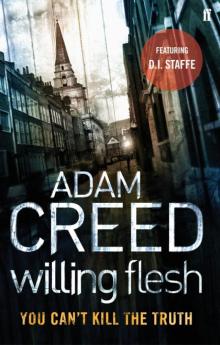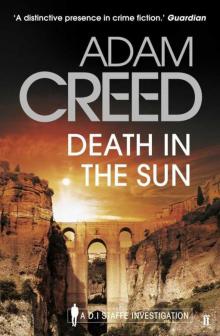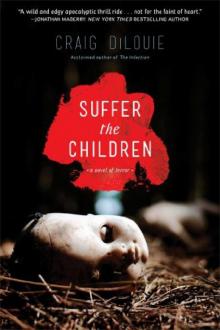- Home
- Adam Creed
Suffer the Children Page 7
Suffer the Children Read online
Page 7
‘The minute I slammed the door on him.’
‘But when did your divorce come through?’
‘Ten months. Are we done?’
‘If you remember anything, about Ross Denness, let me know.’ In the background, a child screams out and Staffe says, ‘We’re done. For now.’
‘How’s his mum taken it? Maureen?’ says Debra. There is another child’s scream in the background. ‘I have to go. Give her my love if you speak to her. And tell her Danielle and Kimberley say “hi”.’
Staffe buzzes through to the incident room and tells Josie to get on to the airlines again and check the name Debra Colquhoun. Then he tells her to pay Karl’s mother a visit. ‘Don’t push her, just get her talking about Karl, and about the first wife too if you can. Softly, softly. And tell her that Danielle and Kimberley say “hi”. Tell her they send their love.’
*******
Josie knows that Maureen Colquhoun is sixty-one years old and has been widowed for three years. Her husband died of sclerosis of the liver, but they had been separated for some time. Karl Colquhoun was her only son.
Maureen shows Josie into the front room. It’s a museum piece of how somebody on a budget might conjure a model of Edwardian comfort, with its fat, veneered furniture and a floral tapestry three-piece; a busy, patterned carpet of purples and greens, a whiff of Mr Sheen. She fusses over Josie, running off to make tea and coming back with biscuits on a doily’d plate, sitting on the edge of her chair, knees together and hands clasped.
‘It is about Karl, Mrs Colquhoun.’
‘Call me Maureen.’
‘I’m very sorry, about what happened to him.’ Mrs Colquhoun nods earnestly, hanging on to Josie’s every word. ‘We’re obviously trying our best to find out what happened. And one of the things is … well, I’d like to know what sort of a man he was, Maureen. What sort of a son he was.’ Josie takes out her digital recorder, says, ‘Do you mind if I tape us?’
Maureen shakes her head, slowly. She looks nonplussed. ‘Does it matter what I say?’
Josie leans forward, holds Maureen’s hands and says, ‘Go on, tell me anything you want. About Karl or Debra or Leanne. Anything, Maureen.’
‘They said he had been drinking. When the police came round they said that he had been killed and it was murder and when I asked who they thought it was, they didn’t want to say but they said my son was inebriated. Well, I know that couldn’t be. He’s never touched a drop, not a drop. He’s done wrong, I know he has, and there’s things I can’t turn a blind eye to no matter how I try, but I won’t believe he’d been drinking. I won’t.’
Josie thinks it curious that a mother might become so agitated about a son who drinks when he is also a father who very probably abused his own children. ‘Do you miss the children, Maureen? Your grandchildren.’
‘How do you know I don’t see them?’
‘They’re in Tenerife.’ Maureen’s face goes tight and she purses her lips. A hard look comes easily to her eyes and she blinks something away. ‘He didn’t tell you, did he?’
‘She took them all the way over there? Mary, mother of God. All the way over there.’
‘They say “hello”, and send their love,’ says Josie, watching Staffe’s message exert its power on the smiling face of Maureen Colquhoun.
‘Poor Debra. God bless her. Oh, those children. Those beautiful children!’
‘You say Karl never drank.’
‘Never a drop and nor would you. Nor would you if you’d had his father.’ The smile has gone again now. ‘It got out of hand, so terribly out of hand.’ She lets go of Josie and puts her hands between her knees in a downturn prayer. ‘He always said it was a sad man who drank in the house, but when I had Karl, he brought whisky into the house. He’d come home from the pub and drink the bottle, the whole bottle. And then he’d go upstairs. Karl would cry as soon as he smelt the stench of drink coming.’
‘When you say he went upstairs, Maureen?’
‘There’s nothing I could do.’
‘If someone really wanted to hurt Karl, to take him to a dark place, they would make him drunk. Is that right, Maureen?’
‘Oh yes. That would be right.’
‘And if someone got him drunk, against his will, they would have to know him quite well. Not many people knew about his past, Maureen? He didn’t talk about it much?’
‘Why would he talk about it?’
Josie wants to stay longer, wants to talk about normal things with Maureen but she decides she will send a counsellor round. It’s something she agrees with Staffe about – there’s nothing to be gained by playing the amateur psychologist.
*******
The day is ending and the heat begins to lift away from London’s tar and glass. Staffe puts down his mobile, registering what Josie has told him about Maureen Colquhoun and her son, the victim.
He switches back and forth from rat run to rat run, south and west to Queens Terrace. He remembers it, the first time. When he bought the flat, his mother and father were not long dead and the weekends there were long, bleak, lonely affairs.
Staffe double-parks and uses a beany hat on top of the dash to wedge a parking permit up against the windscreen. He flips the boot and takes out his thirty-year-old white plastic Adidas holdall. He feels the twinge of a sad and happy memory and closes his eyes, takes a deep breath and exhales in five equally measured orbs. Sometimes he thinks it’s bullshit, but sometimes it works and now, turning the key in the door, he gets a nostalgic glow.
The Queens Terrace flat smells lived-in and although the tenant has left a few things and not hoovered or even put the last meal’s dishes away, Staffe texts the managing agent to say they can return the tenant’s deposit. He sits in the beaten-up old club chair in the bay window and leans back. He eyes up the cornice mouldings and the ceiling rose, thinks maybe it’s time to move back into this one. It would certainly keep him and Marie from each other’s throats. He thinks about young Harry being dragged from pillar to post.
Staffe goes through to the bathroom, takes out his running gear from the Adidas bag and runs the shower. It’s what he’s done since he first joined the Force: a hot shower first, to get him sweating. Then a run and a cold shower when he gets back. He remembers the first time Jessop came round, saw what he was doing. ‘It’s like an exorcism,’ he had said. And he laughed.
The water jets down, hard on his scalp and shoulders and he turns the heat up a notch so it’s almost scalding him. He scrubs and scrubs with the soap, the smell of coal tar getting thicker and thicker, the steam getting more and more dense. As he scrubs, he plaits over and over, in different orders, the events of the last few days.
*******
Josie rations out a glass of Semillon Chardonnay from a box in the fridge and takes a peek at the roasting medley of peppers, courgettes and whole baby carrots, drizzled with olive oil and sucking up the essence of two bulbs of garlic. Her mouth waters and she sets out two pork chops, seasons them and checks her watch, skips across the room and kneels into the diminishing space where her CD player sits on the floor under the small window that juts into the angle of the roof.
It took a leap of faith and every scrimped and saved halfpenny she could muster, but three years ago, with some help from her parents down in Hastings, Josie Chancellor bought this studio flat in the roof space of an old, unrefurbished house near Victoria. Even now, she just about covers the interest on the mortgage and once a quarter she feels her pulse race when she sees what kind of debt she is in with the Alliance & Leicester.
This is the first proper date she has had since she transferred to Leadengate six months ago and although it is David Pulford who is coming round, it’s not him that she is thinking about. ‘Believe nothing of what you hear and only half of what you see,’ is what her father used to say. What would he make of DI Will Wagstaffe?
She sits on the floor with her feet tucked up under her bottom and sips from her glass, questioning her motives for saying ‘yes’ to Pulfo
rd so readily. She curses herself for being so stupid as to invite him round for a meal.
The intercom buzzes and she drains her glass, stooping as she stands so as not to bang her head on the sloping ceiling. She pauses by the intercom’s crackling speaker, lets it buzz again. She sighs, then turns off the oven and puts the chops into a cereal bowl, puts a sideplate on top and places the covered meat in the fridge. The intercom buzzes a third time, long and hard, and she presses the button to receive.
‘Hi, Josie, it’s me,’ says Pulford.
‘Wait there.’
‘What?’
‘I didn’t have a chance to get anything in. Let’s go out.’ She checks in her purse. Three pounds fifty, nothing in the bank, and two days till pay day.
*******
Pounding away, from street to square and on to the Brompton Road, Staffe feels the sweat coming faster and faster. He closes his ears to everything but the shock of the road thudding up from his feet, along his thighs and up into his torso and fast-beating heart. He’s too old for this, but he catches sight of the park on the other side of Knightsbridge and jay-canters through the traffic, up on to the sand-track bridleway. His muscles burn, his lungs roast. The sound gets duller, deeper.
He can see there is one truth that governs everything that happens under the blood-red sky of the city. He knows that this truth is stitched together by the actions of millions of people living alongside each other. Everything is connected and everything can be understood.
Even the clumsy or haphazard criminal will have a rationale. There will be a pattern to their behaviour. The trouble is: the more evidence you accumulate, the more obscured the reasons can become. Denness or Rob Boxall; Leanne or Debra Bowker. Or someone not yet uncovered. Whoever did it knew Karl Colquhoun’s darkest secret.
Staffe looks up into the dusking expanse of the park. He takes a long, arcing U-turn by the Serpentine lake and heads back towards the Knightsbridge lights. He soon has the streets beneath him again, hammering down towards Victoria. After six, seven minutes he accelerates into a sprint, full pelt, and pulls himself up quickly, hands on hips.
His shins are splinting and the sweat comes thick and fast, prickling his scalp, shallowing in the small of his back. It has been three years since his last cigarette but Staffe feels a nicotine craving in his lungs, burning deep, so he straightens himself from his haunches, falls into a painful jog. He says ‘per-severe, per-severe’ over and again, feeling too old for this.
*******
In the sumptuous pastel interior of a classical Georgian building in Mayfair, Guy Montefiore declines the kind offer of another glass of champagne and attempts a swift exit from the offices of Synge and Co.
On his way out of the building, Guy sees old man Synge coming in off the street and he looks around the foyer for a corner to occupy, any refuge from an awkward conversation, but the old man has seen him. He waves out of politeness and sticks on an unconvincing smile as Synge comes in off the street.
‘Hello there, Guy. So nice to see you.’
‘Likewise, Patrick. Likewise.’ Guy extends a hand, feels the force of the old man’s powerful grasp.
‘Everything fine?’ says Patrick Synge with the tilted head of a confidant.
‘Everything,’ says Guy, summoning a stoic smile. Despite the pleasantries, their relationship is governed by contracts like Bibles, fees the size of operating theatres.
‘Fine. Just fine. No more nonsense, hey?’
‘Not a bit of it. Sorry, Patrick …’ Guy hasn’t actually stopped moving, ‘… I’m already late.’
‘Don’t let them work you too hard,’ calls the old man as Guy slots into the revolving door.
Guy Montefiore makes his way through the arch by the Grapes and into Shepherd’s Market. He veers right, away from the raucous apron of suited drinkers that spills into the small square.
He is completely unaware of a man twenty paces behind.
When he very first spied Montefiore, the man had expected a thin, balding, greasy fellow with a grey pallor and stained suits. What he got was younger, smarter, taller, broader – someone you might see getting out of a Merc in the tennis club car park, giving you a firm handshake.
He watches Montefiore hail a cab and climb in and the man lets him go. He knows where Montefiore will be headed and he takes his time getting his own cab. He isn’t here to follow Montefiore – he knows him just about well enough, he thinks – but to test how close he can get.
‘Whereabouts?’ says the cabbie.
‘South Ken, for starters. Go through the park.’
They make their way through the fag end of the rush-hour traffic and he sits right back, watches Hyde Park Corner and the top of Park Lane scroll by. This is the city he loves, yet it allows a man like Montefiore, and people just like him, to do the things he did and hold down a plum job.
*******
Staffe can’t get his breath, feels as if the life is being pushed out of him. He gulps at the air and braces himself for another onslaught, counts down, slowly from ten, then turns off the tap. The shower stops and he leans against the glass bricks. They were Sylvie’s idea, but now they need repointing. The Queens Terrace flat needs some care. As the water drips to nothing and his head still pounds, he thinks he can hear someone calling out. He steps out naked and opens the door, drips across the bedroom floor as he calls, ‘Who’s there? Who’s there!’ He has goosebumps and hears it again. It can’t be. Not after three years.
‘Sylvie!’
He runs into the hallway, not sure where the voice is coming from. He slows himself down, breathes deep, and goes into the kitchen. Nobody is there but he can still hear something. There is water deep in his ears.
Going into the lounge, he realises what a fool he has been. The voice is coming from a radio alarm. Not his, the old tenant’s. Why would they wish to be awakened at dusk? And because it is getting darker outside, he can see himself naked in the tall, twelve-paned Georgian windows. He kneels down so he can just see his head and chest. He feels foolish but doesn’t want to move. A memory wraps its arms around him. He is happy and sad.
‘It’s like living in a bloody goldfish bowl!’ Sylvie had shouted.
‘I’ve nothing to fear from the world,’ Staffe had said.
She hated it when he refused to draw the curtains. ‘And that’s the trouble, Will.’ She crosses her arms underneath her breasts. ‘That’s the bloody trouble.’
They have been arguing all weekend and he is tired of it all. He is dehydrated but wants more to drink. He thinks she might have sneaked upstairs for a line but won’t say anything because he knows he is in the wrong, regardless.
She says, ‘You’ve nothing to fear from the world. It can’t touch you.’ She takes a step closer, breathes in deep. ‘You’ve been with him. I can smell it on you.’
‘It’s my job for Christ’s sake.’
‘Draw the bloody curtains, Will.’
He looks at the floor, follows the pattern in the parquet.
‘And tomorrow you’ll be off on the wild goose chase, I suppose. That’s our time. You promised.’
‘They’re my parents. Jesus! If I can’t …’
‘They’ve been dead fifteen years.’
‘Nineteen.’
‘I’m only twenty-six, Will. I was seven when they died. I’m too young to be playing second fiddle to old men and ghosts.’
‘I’m too old for you.’
‘Oh no. You’re not having that. You’re just too bloody …’ She is picking up her coat from the club chair by the window. She looks out of the window. ‘People can see us, Will. All I wanted was for you to draw the curtains and take me out for the day tomorrow. You know what day it is?’
He knows. They had been together three years.
The phone rings and she stops in her tracks. ‘Don’t answer it, Will.’
‘It’s Jessop,’ he says.
‘You don’t say.’
‘He needs me.’
‘He’ll u
nderstand.’
‘They’re trying to get rid of him.’
‘I want us to be together, Will. I really do.’
The phone stops ringing.
‘I’m trying to be loyal. A friend. How can loyalty be a bad thing?’
She walks to the door, says, ‘You’re not being loyal, you’re choosing, Will. You’re choosing to be with them rather than me.’
Staffe watches her go, wants to follow, but the phone goes. She closes the door and he picks up.
‘The bastards have done it, Staffe. They’re sending me to the Met.’ It sounds for all the world as though Jessop has been crying. The hardest man he knows.
‘Can I call you back?’ The front door slams.
‘I can’t go there. This place is my life. My fucking life! And they know it, Staffe. They want shut of me.’
Staffe watches Sylvie step off the pavement. She takes a stride out in front of a taxi and puts her hands on her hips to stop it. If you saw her, you’d stop too.
‘Let’s go for a drink, Staffe. I need to talk to someone.’
‘What about Delores?’
‘She’s not here.’
Sylvie gets into the cab. She doesn’t look back.
‘You know this’ll be good for you, don’t you, Staffe? They’ll make you up to DI. You’d better come see if the shoes fit.’
‘I’ll see you in the Scotsman’s Pack.’
Above the rooftops, the sky is streaked a salmon colour. Opposite, a taxi is parked up. Its ‘for hire’ light is switched off. It must be on a pickup.
Staffe’s mobile rings and he stands up, looks for it. Staffe can see himself naked in the window. He walks slowly out of the room, follows the tone and answers.
‘You’re not here,’ says Marie. ‘I said I’d cook.’
‘I might not be back for a couple of nights.’
‘You’re pissed off with me already?’
Staffe can hear a crack in his sister’s voice, suspects she has probably been drinking. ‘There’s a place I’ve got to take care of.’

 Pain of Death
Pain of Death Willing Flesh
Willing Flesh Death in the Sun
Death in the Sun Suffer the Children
Suffer the Children